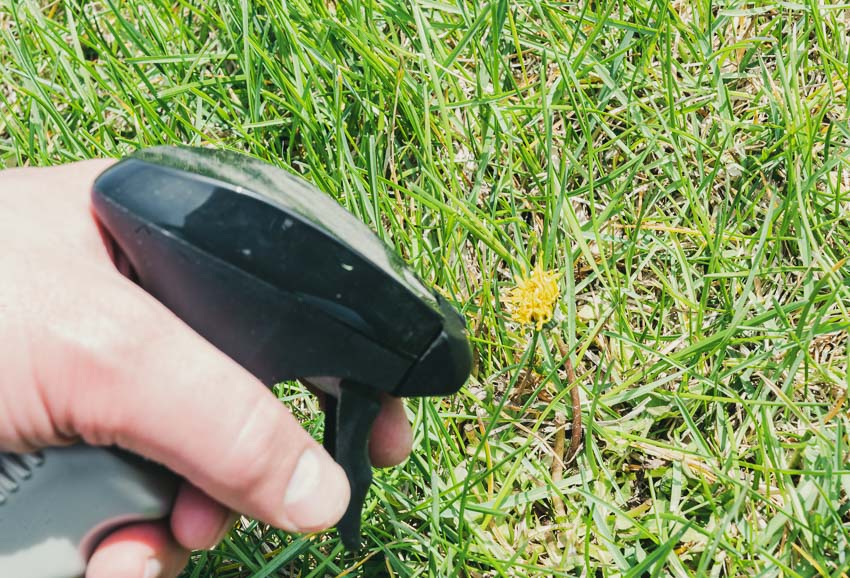The Ultimate Guide to Achieving a Weed-Free Lawn Without Chemicals
Are you looking for a recipe for homemade weed killer? DIY weed killers are less expensive and don’t contain harsh chemicals; you can mix them right in your kitchen. Learn how to make homemade weed killer that works with a few simple ingredients that you already have in your home.
What is Homemade Weed Killer?
There are several types of homemade weed killers that you can make as a natural, non-toxic alternative to commercial herbicides. Since most of them are non-selective, you have to be careful about using them as weed killers for lawns, but they work great in other areas of your yard.
Homemade weed killers work best if you apply them a few times, and it’s important to understand the best way to use them.
Components of a Typical Homemade Weed Killer
One of the best homemade weed killers is made with white vinegar, salt, and liquid dish soap, which are mixed together and sprayed on weeds to kill them. You can also make homemade weed killers with rubbing alcohol, boiling water, and corn gluten.
If you’re determined to avoid harsh chemicals, you can use many natural weed killers, including mulch, ground covers, plastic sheeting, and landscape fabrics. However, making your own weed killer is one of the easiest ways to get the job done.
How to Make Homemade Weed Killer
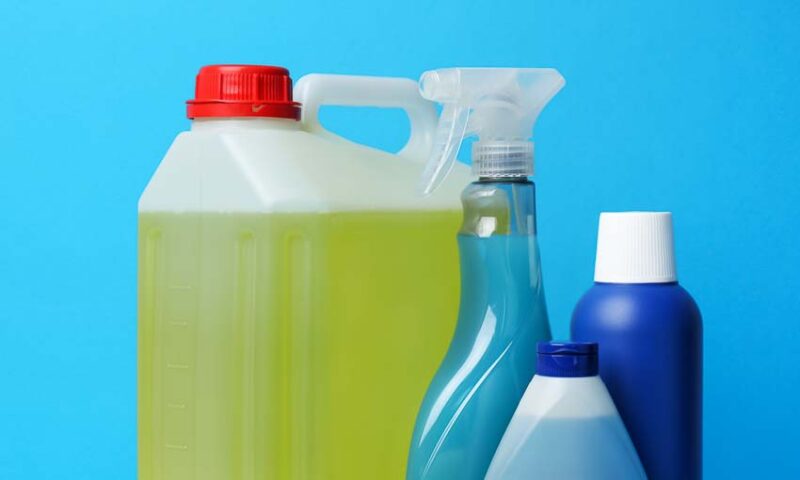
You can find many ingredients used in homemade weed killers right in your home. And you can save money and a trip to the store by mixing up a brew of weed killer right in your kitchen sink.
When making homemade weed killers, follow these guidelines.
Essential Steps to Creating Your Own Weed Killer
The first step in choosing a homemade weed killer is understanding the type of weed infestation you have.
There’s a big difference between eliminating a few weeds versus killing off an entire section of your lawn. Also, some types of natural weed killers only work as pre-emergents, like corn gluten, while others just work on already-established weeds.
One important thing to remember is that killing weeds naturally usually takes more persistence than harsh chemicals do. You will have to apply homemade weed killers multiple times because the plant’s roots don’t absorb them like they absorb glyphosate, which is the main ingredient in many weed killers.
Even so, you’ll see noticeable results within a few hours; after a few treatments, the weeds will disappear.
Gathering Materials
You can make the most effective homemade weed killer with vinegar, salt, and dish soap, which many people already have at home. You’ll also need a spray bottle or, if you have a large weed infestation, a one-gallon pump sprayer works best.
Vinegar
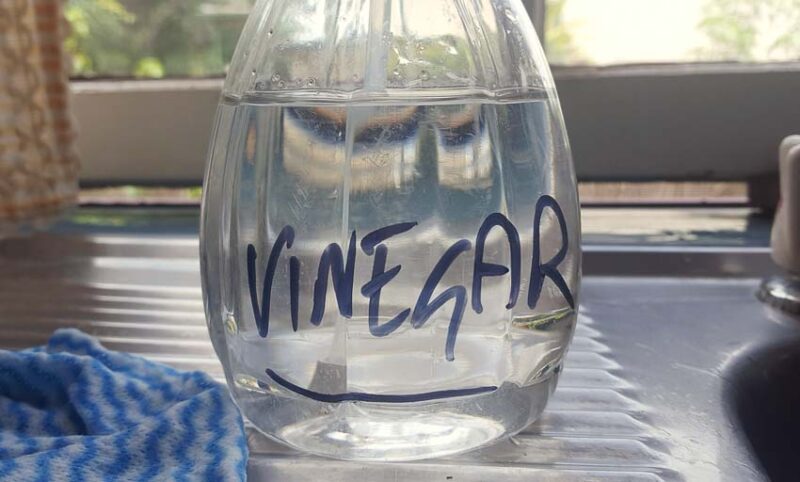
Household white vinegar with a 5% acetic acid concentration works fine for homemade weed killers, but you can also use apple cider vinegar, horticultural vinegar, or cleaning vinegar.
Various types of vinegar have different concentrations of acetic acid. Most household vinegar is 4% to 8% acetic acid, but the best type for weed killers has at least an 11% concentration. You can commonly find vinegar in 20%, 30%, 45%, and 75% solutions, and the higher the acetic acid, the more deadly it will be to weeds.
It’s important to note that anything over 11% can burn your skin and cause eye damage.
Salt
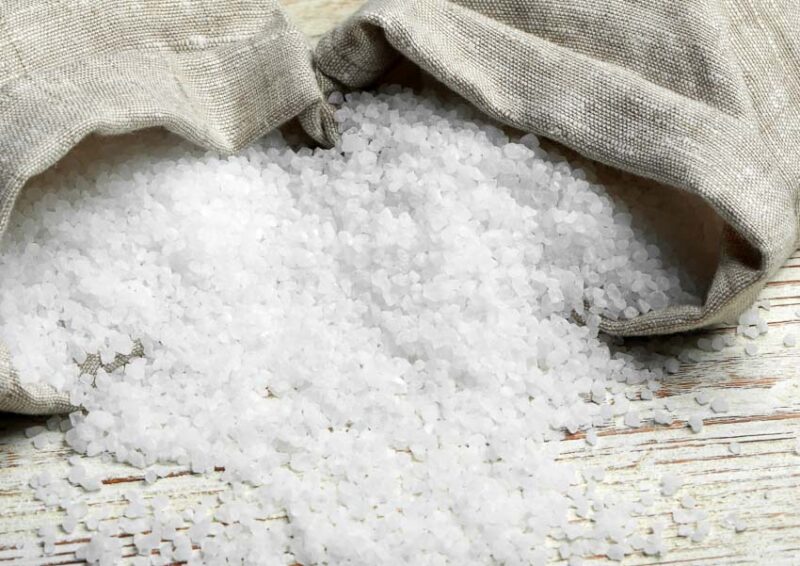
Normal table salt is used to make homemade weed killer, but you can also use Epsom salt, rock salt, curing salt, and de-icing salt. Salt is a desiccant, so it works by dehydrating plants. It dries them out and disrupts the water balance in their roots and leaves, causing them to die.
Vinegar kills weeds quickly but doesn’t get to the root of the matter, and salt takes about 10 days to work before the roots completely absorb it. So, combining the two is quite useful, especially with multiple treatments.
Dish soap
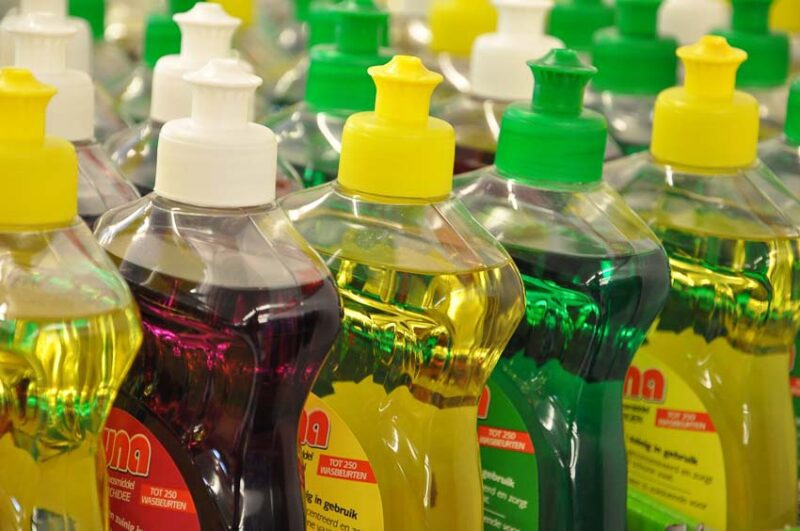
The soap in this popular homemade weed killer recipe works as a surfactant , which reduces tension so that the vinegar and salt solution can spread more easily on the surface of the leaves. Surfactants in weed killers also work to keep them on the leaves longer to be effective for longer periods.
Preparing the Mixture
Mixing up a homemade weed-killer solution by adding all the ingredients together is easy. You might have to shake the bottle or sprayer to get the salt to dissolve completely.
Place it in a spray bottle or pump sprayer, and you’re ready to go.
Safe Storage and Usage Tips
While not as toxic as chemical weed killers, you should always label homemade weed killers and store them in locked areas away from pets and children. You should also keep pets and children away while using homemade weed killers.
Animals have keen senses of smell, and vinegar irritates their sensitive noses.
When working with vinegar that has high concentrations of acetic acid, wear long-sleeved shirts and pants, and use latex gloves and goggles to prevent getting it on your skin. If it does come in contact with your eyes or skin, rinse repeatedly with water.
Recipe for a Basic Homemade Weed Killer
Here is the best homemade weed killer recipe, which you can make at home right in your kitchen:
- 1-gallon vinegar
- 1 cup salt
- 1 tablespoon of dish soap
Mix the ingredients together, and place them in a one-gallon pump sprayer. Shake to ensure that the salt is completely dissolved.
Learn how to get rid of Crabgrass with our comprehensive guide!
Step-by-step Guide to Your First Weed-Killing Mix
Use this step-by-step guide for the best results when using this homemade weed killer.
- Know the type of weed you are targeting. Is it an annual or a perennial? Annuals are usually easiest to control with pre-emergents like corn gluten, and tough perennials like dandelions can be challenging. So, be prepared to reapply this mix a few times and try to get to the weeds while they are still small.
- Understand that vinegar weed killer is non-selective. This homemade weed killer will kill all plants, so use caution when applying it.
- Apply on a sunny day. Rain will wash away your homemade weed killer, and it will be more effective on a hot, dry day when the leaves absorb the most moisture.
- Use protective gear. Even though it’s not as harmful as glyphosate, vinegar can still irritate your skin and cause damage to your eyes, especially in high concentrations. Non-permeable gloves, eye goggles, and a face mask can help protect you from splashes and spills.
- Mix up your recipe. Just like you can use vinegar with different concentrations of acetic acid, you can add varying amounts of water to your weed-killing mix. For best results, use a strong concentration for the first application, and follow it up with a mix made with 1 part vinegar to 1 part water. Continue to add salt and dish soap because they have specific purposes.
- Apply your weed killer. Use caution to avoid drift, and don’t apply on a windy day. Wait at least a week to 10 days before reapplying.
What to Know About Homemade Weed Killers
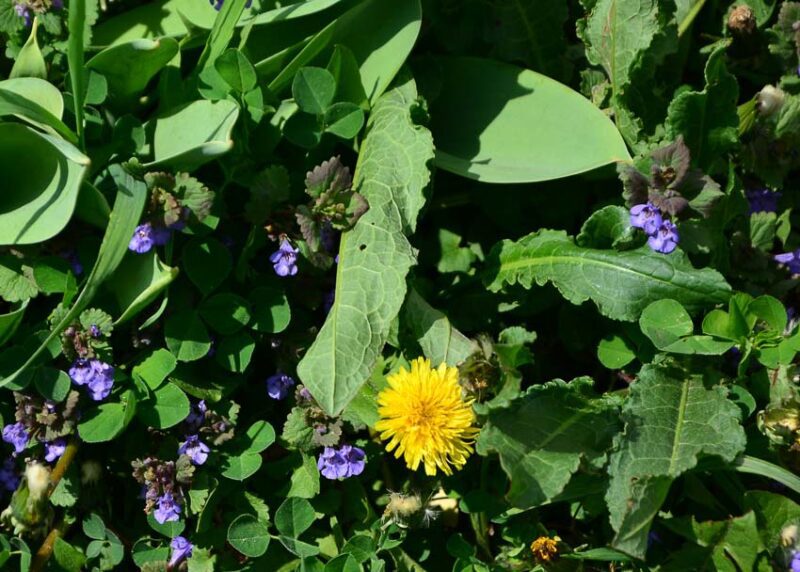
Here are a few other important facts you should know about homemade weed killers:
- The best time to apply homemade weed killers is during the hottest part of the day. Evening dew will reduce the efficacy, just like rain will.
- High concentrations of vinegar are more effective at killing weeds, but they can also harm beneficial microorganisms in your soil, like microbes and earthworms.
- Vinegar can damage concrete, so there may be better choices for concrete paver patios, driveways, and sidewalks.
- If you use vinegar weed killer frequently, it can change the pH of your soil. If you’re concerned that your soil is too acidic, test your soil and add lime to balance the pH.
- Large weeds like thistles are easier to kill by cutting them down and using Epsom salts directly on the roots.
- Vinegar weed killers work best on broadleaf weeds and are less effective on grasses.
- Homemade weed killers are more effective against young weeds that don’t have well-established root systems.
- Don’t forget to protect your eyes and skin from vinegar.
To kill or not to kill? That’s the question. Read our guides on growing a clover lawn or getting rid of clover!
Advantages of Homemade Weed Killers Over Store-Bought
Homemade weed killers have several advantages over store-bought chemicals. Learn why you should choose DIY weed killers over their commercial counterparts, and discover the benefits they offer in terms of cost, environmental impact, and your family’s health and safety.
Why Choose DIY Over Commercial Weed Killers?
The types of weed killers that you can make at home don’t contain harmful chemicals like glyphosate, and they are the best choice for organic vegetable gardens. They also work well on pathways and mulched landscaping beds.
While homemade weed killers might not be as effective as products like Roundup, they don’t present health and environmental risks, and they can make it easier to maintain your garden and keep it weed-free.
Cost-effectiveness
Vinegar, salt, and dish soap are inexpensive products. DIY weed killers are a cost-effective solution if you’re using small amounts of weed killers and applying them a few times a year.
Environmental Impact
The main ingredient in commercial weed killers–glyphosate–isn’t only deadly to plants. It takes a long time to break down, and some studies suggest that glyphosate is toxic to humans and animals, especially aquatic life.
It has been linked to reproductive and developmental problems in various species.
Health and Safety Benefits
One of the primary concerns with chemical herbicides is endocrine disruption, which leads to increased risks of developmental disorders, cancer, and birth defects. Unfortunately, it’s quite likely that the long-term effects on human health are not yet fully understood.
Unlike glyphosate, the molecules in homemade weed killers break down quickly, which is one of the reasons they aren’t quite as effective. There is a trade-off between the effectiveness of chemical herbicides and their associated health risks, though, and homemade weed killers offer a better solution with much less risk.
It’s important to remember that your yard is an extension of your home. So during the growing season, when your pets and children are playing in your yard and rolling around in the grass and dirt, you want it to be as safe and healthy as possible for everyone.
Frequently Asked Questions (FAQs) About Homemade Weed Killers
Are Homemade Weed Killers as Effective as Store-Bought Ones?
Homemade weed killers are not quite as effective as store-bought ones, especially on certain types of plants like grasses and long-lived perennials. However, it will weaken them, and with multiple applications, you can have a weed-free yard without sacrificing your health and safety.
Can Homemade Weed Killers Harm My Plants?
Homemade weed killers aren’t selective; if you’re not careful with your application, they can harm the plants you want to keep. While this makes them less useful as weed killers for grass yards, there are other ways to maintain a beautiful, weed-free lawn without using chemicals.
How Long Does It Take for Homemade Weed Killer to Work?
You’ll notice a difference immediately when using homemade weed killers made with vinegar, salt, and dish soap. The acid in the vinegar will knock back weeds within a few hours, but the desiccating action of salt takes about ten days to kill weeds.
How Often Should I Apply Homemade Weed Killer?
After applying DIY weed killer, it’s best to wait about 7 to 10 days before reapplying. This gives the salt a chance to dehydrate the roots. Weed killer works best on young, tender weed seedlings. Consider using other methods for tough weeds, like cutting them off and applying Epsom salt directly to the roots.
Can I Make Weed Killer from Kitchen Waste?
You can make weed killer from leftover pickle juice containing salt and vinegar.
Instead of throwing it away, save pickle juice in a large gallon jar in your fridge. It won’t go bad, and when it comes time to get rid of weeds, strain it through some cheesecloth, add a little dish soap, and use it just like you would other homemade weed killers made with vinegar.

